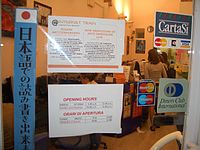Diferencia entre revisiones de «Seudonimato y anonimato»
m Revertidos los cambios de 190.42.9.10 (disc.) a la última edición de 190.101.96.169 |
|||
| Línea 12: | Línea 12: | ||
==Véase también== |
==Véase también== |
||
* [[Pseudónimo]] |
* [[Pseudónimo]] |
||
Tours to the Colca Canyon |
|||
Most visitors to the Colca Canyon go on an organized tour from Arequipa. |
|||
These are generally two days, and include some of the attractions on the route to Chivay, the thermal baths in Chivay, the Cruz del Condor and visits to some of the towns. This is a very good way of seeing the main attractions in the canyon, although obviously does not allow any scope for exploration. |
|||
Almost every agency in Arequipa organizes two – day tours, charging around $20 – $25 per person, including basic transport, accommodation and entrance to the Cruz del Condor. It is possible to vary certain items. |
|||
If you want to stay in better accommodation, price rises accordingly. It is also possible to go on a private tour. |
|||
The big advantage of a private tour is that you can decide exactly where to go and how long to spend at each place. It is also possible to go on a one-day tour, although few agencies now offer this, as it is too far to go in one day. The one – day tour does not allow you to see the condors. |
|||
Chivay’s food: |
|||
If your stomach is up for it, try the street food and drinks in Chivay. The hot drinks they serve up at night are a great little brew with a variety of flavours to choose from. |
|||
The street stalls selling maize and chicken feet are not as bad as you think. It is a great little appetizer (cheap too) with a difference, though the chicken feet are slim pickings. |
|||
In the surroundings of the Main Square of Chivay there is a variety of restaurants of typical foods of the area, as well as eaten arequipeña, you can choose where he would like to eat. |
|||
[[ |
|||
== Enlaces externos == |
== Enlaces externos == |
||
Revisión del 03:33 15 jun 2010

El anonimato es el estado de una persona siendo anónima, es decir, que la identidad de dicha persona es desconocida. Esto puede ser simplemente porque no se le haya pedido su identidad, como en un encuentro ocasional entre extraños, o porque la persona no puede o no quiere revelar su identidad.
Por ejemplo, esto puede suceder a víctimas de crimen y guerra, cuya identidad no puede ser reconocida.
Disfrazar la identidad de uno puede también ser por elección, por razones legítimas como la privacidad y, en algunos casos, seguridad personal. Los criminales a menudo prefieren mantener su anonimato, como en el caso de escribir una carta con una amenaza o demanda.
En una gran ciudad existe mayor anonimato que en pequeños poblados. Esto puede ser considerado tanto ventajoso como desventajoso.
Los trabajos anónimos no siempre poseen un autor conocido. Pueden ser el resultado de una tradición folclórica, la difusión oral; o puede tratarse de que la información del autor fue perdida o escondida intencionalmente.
Véase también
Enlaces externos
 Wikiquote alberga frases célebres de o sobre Seudonimato y anonimato.
Wikiquote alberga frases célebres de o sobre Seudonimato y anonimato.
